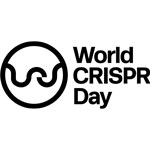World CRISPR Day Date in the current year: October 20, 2026
 World CRISPR Day was created to celebrate an amazing genome engineering technology that won a Nobel Prize in 2020. It is observed annually on October 20.
World CRISPR Day was created to celebrate an amazing genome engineering technology that won a Nobel Prize in 2020. It is observed annually on October 20.The acronym CRISPR stands for “clustered regularly interspaced short palindromic repeats”. It refers to a family of DNA sequences that can be found in the genomes of nearly 90% of archae and 50% of bacteria. These sequences provide prokaryotic organisms with immunity from bacteriophages (viruses that infect archae and bacteria).
CRISPR associated protein 9 (Cas9) plays an essential role in the immunological defense of certain bacteria. It uses CRISPR sequences to recognize and cut the specific strands of the viral DNA. A simplified version of this mechanism became the basis for the CRISPR-Cas9 genome editing technique, also known as CRISPR gene editing.
The revolutionary technique was discovered by the American biochemist Jennifer Doudna and the French researcher in biochemistry, genetics and microbiology Emmanuelle Charpentier. In 2011, they met at a conference and began collaborating on repurposing the CRISPR-Cas9 bacterial immune system. Working together, they showed that the Cas9 protein could be programmed to make cuts in any DNA sequence.
In other words, Doudna and Charpentier proved that the CRISPR-Cas9 technology could be used for genome editing. In 2020, they received the Nobel Prize in Chemistry “for the development of a method for genome editing”; Doudna and Charpentier’s discovery is widely regarded as one of the most revolutionary discoveries in the history of biology. In addition, they were the first all-female team to be awarded the Nobel Prize in Chemistry.
The CRISPR-Cas9 genome editing technique has a very wide range of possible applications. For example, it can be used to create disease models, to develop treatments for various diseases (especially genetic ones), to create novel solutions for the agricultural industry, and to eliminate invasive species. CRISPR-based therapies have a potential to treat or even cure many diseases, including beta thalassemia, cancer, cystic fibrosis, diabetes, Duchenne’s muscular dystrophy, HIV/AIDS, hemophilia, Huntington’s disease, and sickle cell disease.
World CRISPR Day was launched in September 20 by Synthego, a genome engineering company that strives to revolutionize genome engineering technology and ultimately make gene therapy accessible to everyone who needs it. The observance aims to raise awareness of CRISPR among the general public by explaining the complex technology in simple words, as well as to unite the genome engineering community to further develop gene therapy in order to benefit patients around the globe.
World CRISPR Day events include conferences, seminars, symposiums, and other events where researchers can share the latest developments in CRISPR related research and discuss their practical applications. If you want to join the celebration, you can read some articles or watch a documentary about CRISPR and, of course, spread the word on social media with the hashtag #WorldCRISPRDay.
- Category
- International Observances
- Tags
- World CRISPR Day, international observances, gene editing, genome editing, Jennifer Doudna, Emmanuelle Charpentier